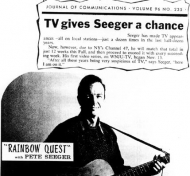
By now we are all familiar with YouTube’s knack for elevating the obscure amateur to star status. But for all you TV addicts bemoaning the writers’ strike out there, here’s yet another reason to turn to online TV: its ability to resurrect the great, unheralded classic.
Caught in strike-induced withdrawal, I recently discovered via YouTube Pete Seeger’s Rainbow Quest—not an album or a song, but a short-lived, self-financed TV show Seeger put on for about 40 episodes in the mid-1960s. The show (whose title is a variation on the lyrics of the folksong “Oh, Had I A Golden Thread”) had a casual format, with Seeger chatting up his musician guests, many of whom were his friends, in between songs. Rainbow Quest‘s setting and tone are quintessential Seeger: He and his guests sit around a rustic living room set, discuss their craft in earnest tones, and, when it’s time for a song, Seeger, clad in his proletarian clothes, often joins in on the banjo.
By the mid ’60s Seeger, born in 1919, was already a folk patriarch, and the admiration of his younger guests—people like Tom Paxton, Johnny Cash, and Judy Collins—shows through.
Rainbow Quest went off the air when Seeger finally ran out of money. The show doesn’t have much of a Web footprint—no Wikipedia page, for example, and just nine mentions on the entire Nexis news database—but thanks to a few committed users there is a wonderful cache of Rainbow Quest clips on YouTube. Here’s Seeger, Johnny Cash, and June Carter doing “As Long as the Grass Shall Grow.”
Other brilliant performances include Tom Paxton’s “Ramblin’ Boy,” Richard and Mimi Farina (née Baez) doing “House Un-American Activities Blues,” Mississippi John Hurt’s rendition of “Goodnight Irene,” and Ramblin’ Jack Elliott’s “San Francisco Bay Blues.”
—Justin Elliott












